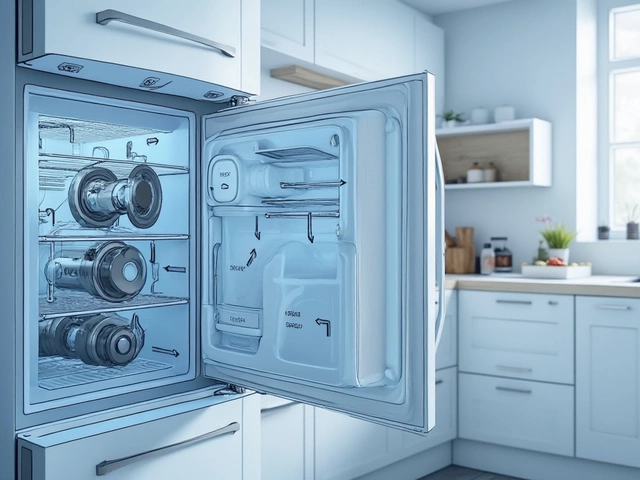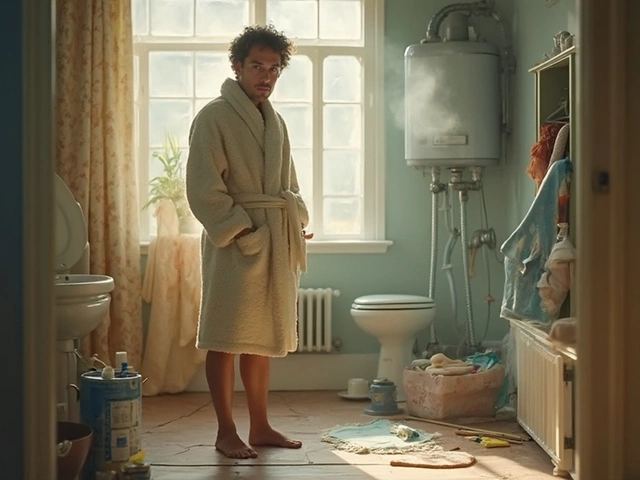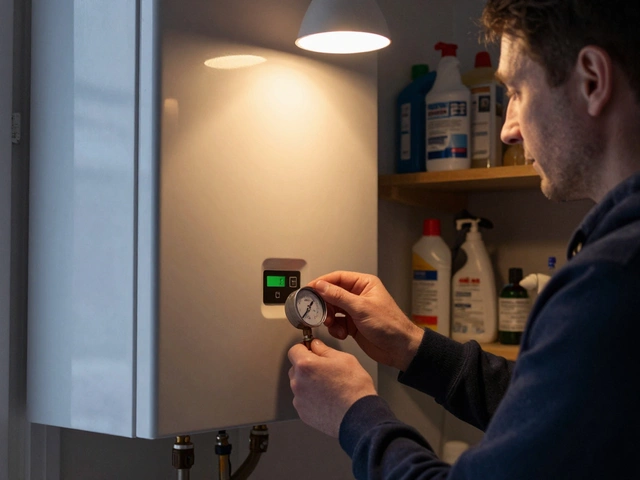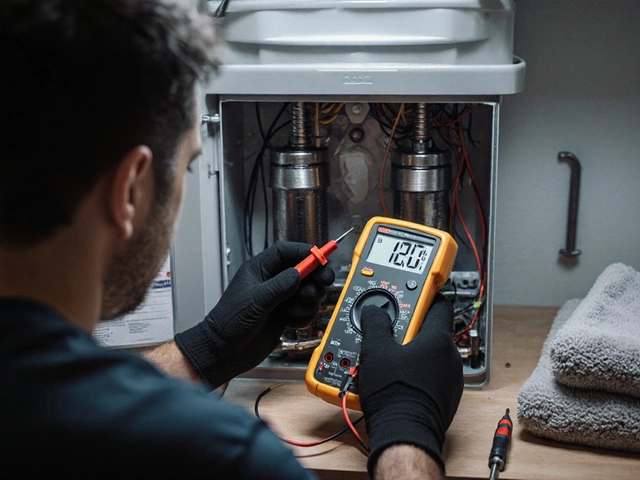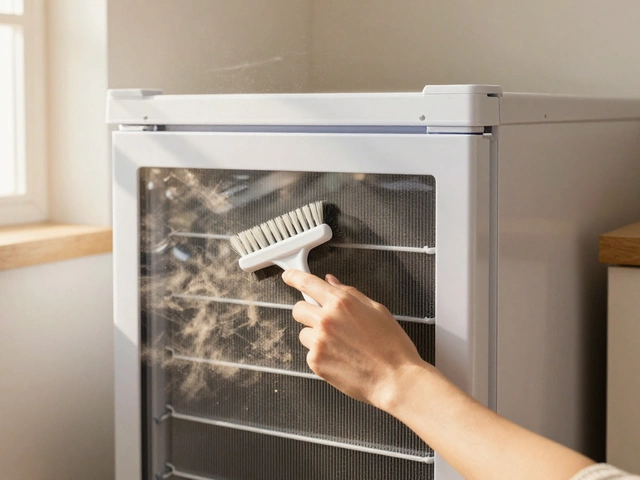The hot water heater is often the unsung hero of our households, diligently working behind the scenes to ensure our showers are warm and dishes are clean. We usually don't think about it until something goes wrong. But how do we know when it's time to stop patching things up with repairs and finally replace this trusty appliance?
Recognizing the signs that a water heater needs to be replaced can save you from unexpected cold showers or potential water damage. The subtle hints of a failing hot water heater can easily go unnoticed if you don't know what to look for. From strange noises to fluctuating water temperatures, this article covers everything you need to determine the health of your water heater.
- Understanding Your Water Heater's Lifespan
- Unusual Noises and Leaks
- Water Temperature Troubles
- Efficiency Drops: Rising Energy Bills
- When Repairs are No Longer Enough
Understanding Your Water Heater's Lifespan
Hot water heaters, like any other home appliance, have a life expectancy that plays a crucial role in deciding whether to repair or replace them. Most standard tank water heaters last around 8 to 12 years. However, some high-quality models with proper maintenance can last a bit longer, stretching up to 15 years. A number of factors influence this lifespan, including the water quality in your area, the frequency of water heater maintenance, and the type of hot water heater you own. Sediment build-up within the tank over time can also reduce its efficiency and longevity. It often goes unnoticed, but when sediment settles at the bottom, it insulates the water from the burner, causing the heater to work harder and age faster. Regularly flushing the tank can help alleviate this issue, yet many homeowners fail to do so.
The energy source can also be a tell-tale sign of a hot water heater nearing the end of its life. Generally, electric heaters might have a slightly longer lifespan when compared to gas heaters. That being said, location influences lifespan too. Areas with hard water may find their heaters wearing out prematurely. It's essential to know your local water quality and consult professionals for specific measures if hard water is an issue. As your water heater approaches its older years, it's wise to be vigilant for signs indicating possible failure. Knowing its age keeps you prepared. If you can't find the serial number when checking the age, it's usually located on a sticker on the upper part of the water heater. The serial number often starts with a letter followed by numbers that represent the month and year the heater was manufactured.
If you treat your water heater like a houseplant and give it some love, it will give you years of comfort in return," says Joe Homeowner, a local plumbing expert.
To further understand how long a water heater can serve your home efficiently, consider the manufacturer's warranty period. This provides a good benchmark for your heater's lifespan. When you're nearing the end of this period, or if your water heater has already surpassed it, it might be time to think about replacement options seriously. Water heater technology has advanced over the years, and newer models are much more energy-efficient than older ones. Investing in a new hot water heater not only reduces the risk of sudden failure but also potentially lowers energy bills. With today's focus on energy conservation, it pays to explore newer models that have state-of-the-art features for maximizing efficiency and safety. Keeping these points in mind will help in making an informed decision on whether to repair or replace the water heater before issues arise.
Unusual Noises and Leaks
Picture this: you're enjoying a quiet evening at home, the world outside hushes to a whisper as you settle in. Then, from the bowels of your basement or wherever your trusty hot water heater resides, comes a low groan. Is there a gremlin trapped inside? Not quite—it's likely the sound of sediment build-up hitting the drum. As water heats repeatedly, minerals in the water separate and settle at the bottom. This sediment can harden over time, causing your water heater to rumble like an age-old steam engine. Ignoring these noises could lead to bigger issues, as sediment build-up can not only damage the tank but also decrease efficiency.
The U.S. Department of Energy explains, "For greater energy efficiency, it is critical to address accumulated sediments in water heaters."
But noises aren’t the only sign that your heater might be vying for attention. Leaks, those sneaky escape artists, can be even more telling. While a slight drip now and again might not seem like cause for alarm, persistent leaks are a red flag. They can signal internal failure of the tank walls or connections. To check for leaks, inspect areas around the water heater, looking for puddles or corrosion. If you find any suspicious signs or feel an uneasy warmth on the exterior, it’s time to consider a replacement.
Common Sounds Explained
Some may be curious about the different grumbles and hisses emanating from their water heater. While a gentle hum is often just the heater warming up, popping or cracking sounds often point to scaling. Scaling occurs when mineral deposits form inside the tank. This isn’t just worrisome noise pollution; ignoring these sounds could hike up your energy bill as your heater works harder than it should. Knocking, on the other hand, might indicate a phenomenon known as "water hammer"—pressure surges that can damage pipes.
Where do leaks most often happen, you ask? They frequently appear around the tank’s bottom or at the fittings. These areas endure repetitive stress from temperature fluctuations and pressurization. Catching these issues early is crucial not only for safety but also to keep your energy costs down. Given that water heating accounts for about 18% of your home’s energy use, according to the U.S. Energy Information Administration, staying proactive can save money and headaches.
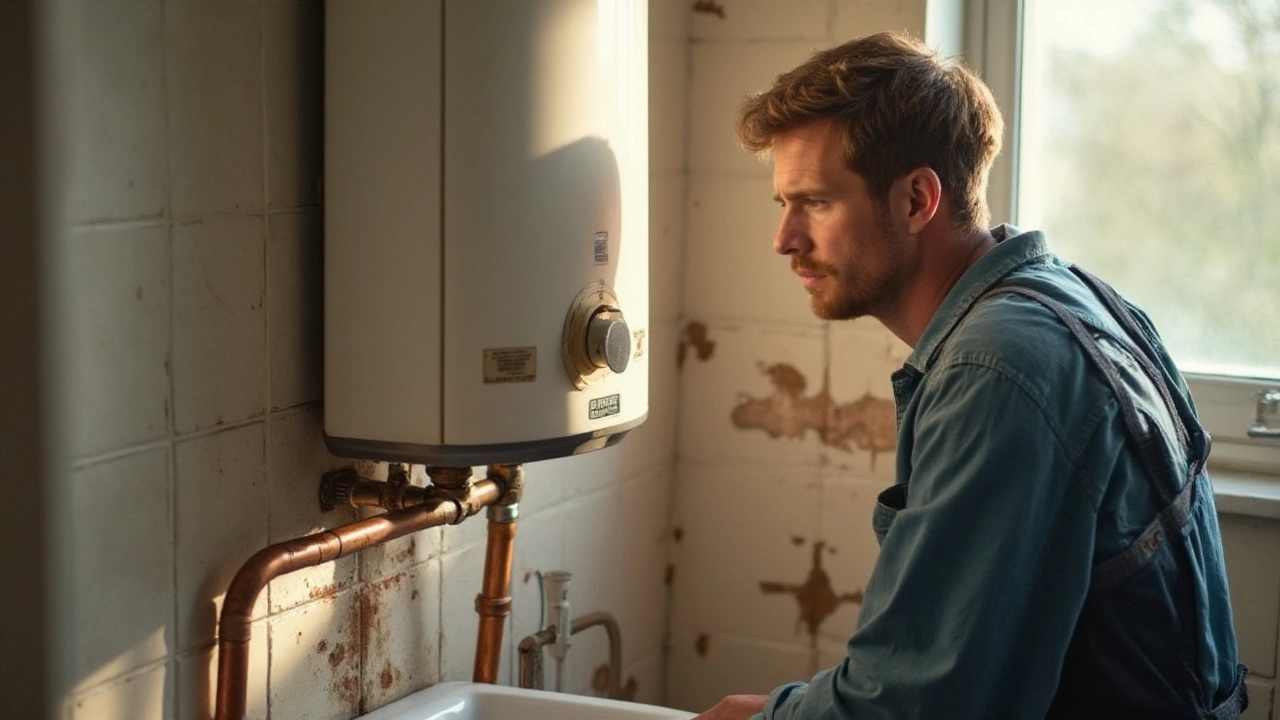
Water Temperature Troubles
Have you ever stepped into the shower hoping for a relaxing experience, only to be jolted awake by a sudden blast of cold water? Or perhaps you've noticed that your water isn't as hot as it used to be, leaving you wondering if your heater has suddenly developed a mind of its own. These are classic symptoms of a hot water heater that's losing its touch. The first indicator that something might be amiss with your water heater is inconsistent water temperatures. Maybe it takes an eternity to get warm, or it never quite reaches the desired cozy heat. This often indicates a faltering heating element or sediment build-up in the tank, both of which can reduce the heater's efficiency.
Sediment builds up over time, especially in areas with hard water. It accumulates at the bottom of the tank, where it can insulate water from the heat source. This reduces the heater's capacity and efficiency, leading to lukewarm water or requiring more energy to heat. Flushing the tank annually can help manage this issue, but if sediment hardens or becomes excessive, it might be time to consider a replacement. Moreover, if you find that you're adjusting your shower routine because it takes longer for the water to heat up, this is another warning bell.
Another telltale sign is the heater constantly running to maintain temperature. This can not only cause wear and tear over time but also reflect in your energy bills. Here, an inefficient water heater can sneakily cause costs to creep up, as it struggles to match the energy input with output. The Department of Energy states that water heating is the second-largest expense in most homes, accounting for 18% of your utility bill. So, an underperforming heater can affect your pocket significantly.
"Don’t wait until your water heater stops working at the most inconvenient time; watch for signs early," advises the Energy Star agency. This alertness ensures homeowners aren't caught off guard and can plan for a replacement without the stress of emergency laundry trips to friends and family.
In some cases, fluctuating water temperatures could also be a sign of a faulty thermostat. This might sound technical, but a professional inspection can quickly determine whether this is the root cause of your troubles. If issues persist despite turning the thermostat up, it might be another indication that it's time to consider retiring your current unit. Whether it's age, expired warranty, or repeated repairs, when the heater becomes less reliable, it's wise to plan the installation of a newer model. Newer water heaters tend to be more efficient and can lead to savings on your energy bills, essentially paying for themselves over time.
Efficiency Drops: Rising Energy Bills
One of the clearest signs that your hot water heater is on its last legs is a spike in your energy bills. While perhaps easy to brush off as a seasonal fluctuation or a minor nuisance, rising heating costs often indicate something more significant. Older water heaters, especially those over a decade old, frequently lose efficiency as their components age and wear down. This decline means the appliance has to work harder to deliver the same level of performance, gulping more energy in the process.
The internal mechanism, such as the heating element in electric heaters or the burner in gas models, can accumulate sediment over time. This layer of sediment acts as an insulator, requiring the water heater to use extra energy to heat through both the sediment and the water. As a result, your heater might be running more often and for longer periods, causing your bills to rise. Paying attention to these increases is crucial, especially if they coincide with other signs of heater trouble.
Consider this startling fact: the Department of Energy states that water heating accounts for nearly 18% of a home's energy use. An inefficient unit will inflate this percentage, spilling over into higher costs. This inefficiency isn't just a problem for your pocketbook; it's also a strain on the environment, contributing over time to a larger carbon footprint. Modern water heaters are built with energy efficiency in mind, often using 10-50% less energy than their older counterparts, which can significantly decrease your monthly expenses and environmental impact.
Let's look at the potential savings more specifically. Imagine a matrix where the average household spends approximately $400-$600 annually on water heating. By upgrading to a more efficient model, you might save upwards of 30%, which translates to about $120-$180 a year—a tangible return just by switching to new technology. Leakages, erratic water temperatures, and unusual noises, when combined with climbing bills, serve as a signal it's time to start shopping for a replacement.
"An inefficient water heater is a silent drain on resources," notes Eileen Eastwood, an energy conservation expert. "By ignoring the early signs of failure, homeowners inadvertently invest more in energy bills than they would in a robust new model."
The fact remains: routine maintenance and timely replacement can help you maintain control over your energy expenses. While it might seem tempting to squeeze a few more months or years out of an old model, remember that efficiency matters. Not only is it vital for your comfort and costs, but it also plays a crucial role in promoting a sustainable lifestyle. While repair might seem like the immediate solution, sometimes the best action is to let go and opt for a modern, efficient model that meets today's rigorous energy standards.
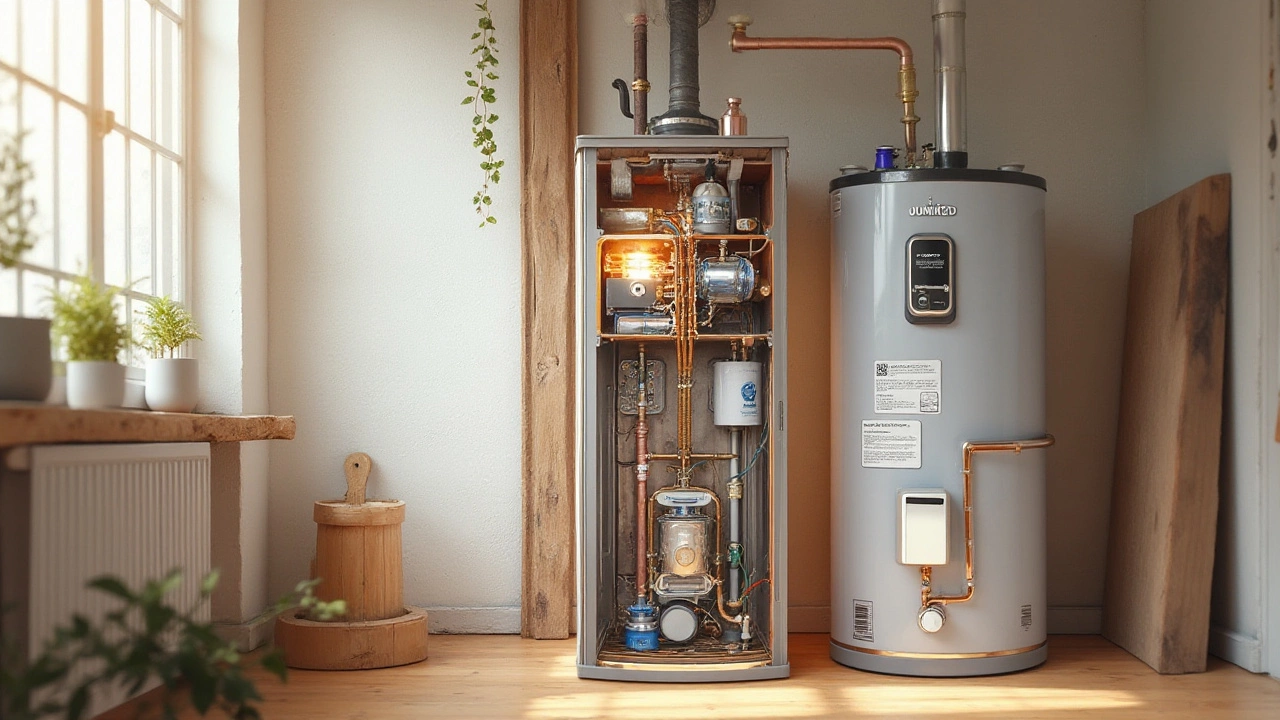
When Repairs are No Longer Enough
There comes a point in every appliance's life when repairs just don't cut it anymore. Your trusty hot water heater may have loyally served your household for years, but every machine has its limits. Knowing when to pivot from piecemeal fixes to a complete replacement can prevent lingering frustrations and even more significant expenses down the road. Sometimes, throwing good money after bad isn't the wisest choice, especially when your appliance is past its prime.
One major indicator that replacing your water heater is imminent is the age of the appliance. Most traditional tank water heaters have a lifespan of about 8 to 12 years. If yours is nearing or has surpassed this age bracket, it's likely time to consider an upgrade. The older your unit, the more inefficient it becomes, which means more energy wasted and higher bills. This inefficiency can add up surprisingly fast, sneaking into your budget without you realizing it.
"An aging water heater may still function, but with reduced efficiency, leading to increased energy consumption and higher costs," says home improvement expert James Robinson.
Another major sign indicating permanent retirement is when repairs are becoming recurrent and increasingly costly. If you find yourself on a first-name basis with your local repairman, that's a red flag that the money spent on these frequent fixes could instead be funneled into a new, reliable unit that doesn't require constant attention. In many cases, a new unit is designed to operate with enhanced technology aimed at saving energy and heating water more effectively, making it a worthwhile investment.
Additionally, the physical condition of the heater should not be underestimated. Rust, corrosion, and leaks are not just minor annoyances; they are signs of wear that can foreshadow larger malfunctions. If your water heater is spewing rusty water or developing leaks, it is more than a cosmetic issue—it's a serious indication that the inner material has deteriorated. Over time, sediment buildup inside the tank can also lead to complicated issues, often shortening the heater's lifespan with no viable repair solution.
| Indicator | Repair or Replace |
|---|---|
| Unit Age (Over 10 years) | Replace |
| Frequent Repairs Needed | Replace |
| Rust and Leaks | Replace |
While repairs might seem like the cheaper short-term option, they can ultimately end up costing more than a new heater. Continuously patching up a failing unit is akin to putting a band-aid on a dam—inevitable disaster is just around the corner. By opting for a replacement when the signs are clear, you ensure a steady supply of hot water, keep your energy bills manageable, and perhaps most importantly, regain peace of mind knowing your home's heating system is reliable once more. Consider exploring energy-efficient models or even tankless options that could dramatically improve both sustainability and performance in modern homes.



